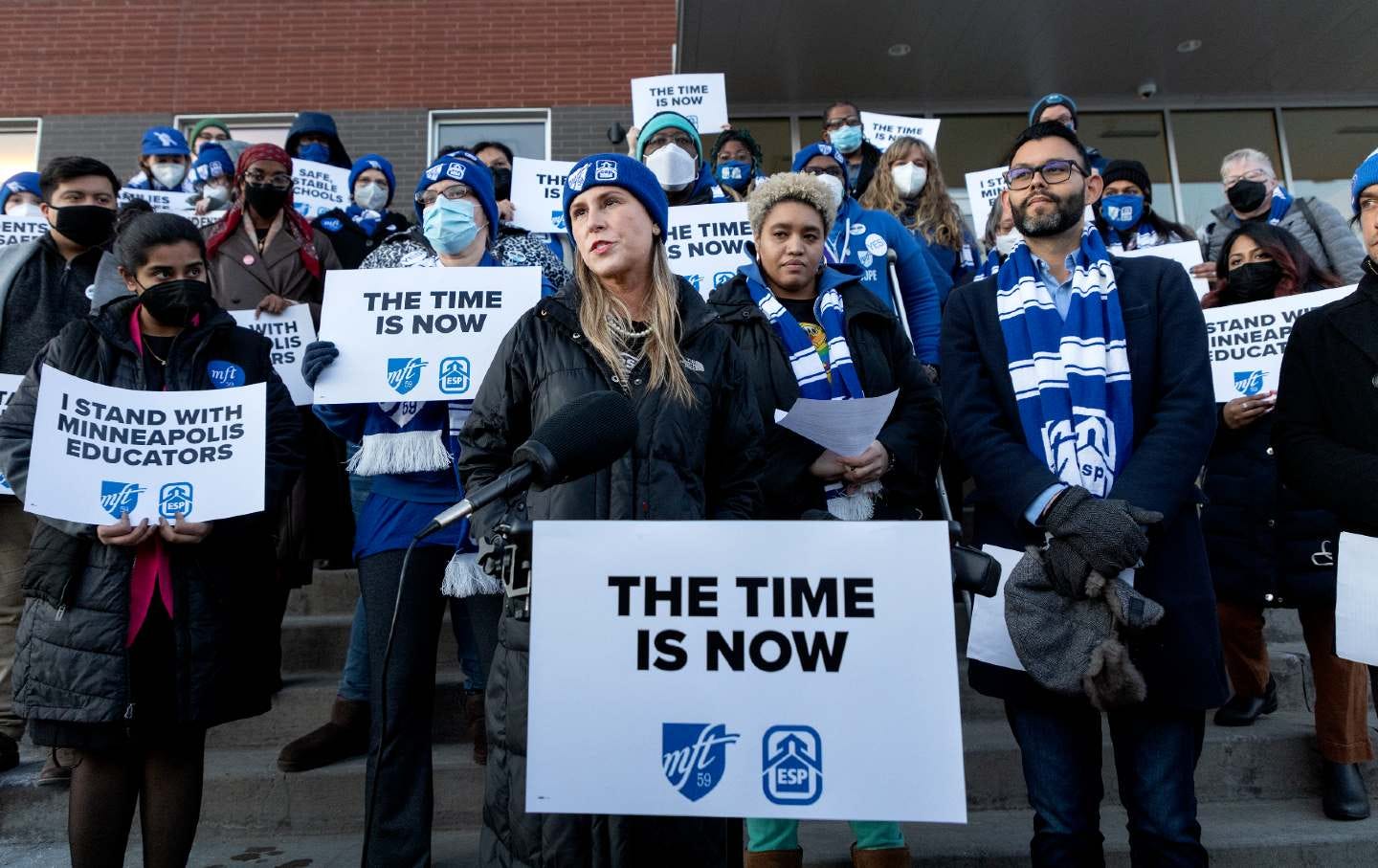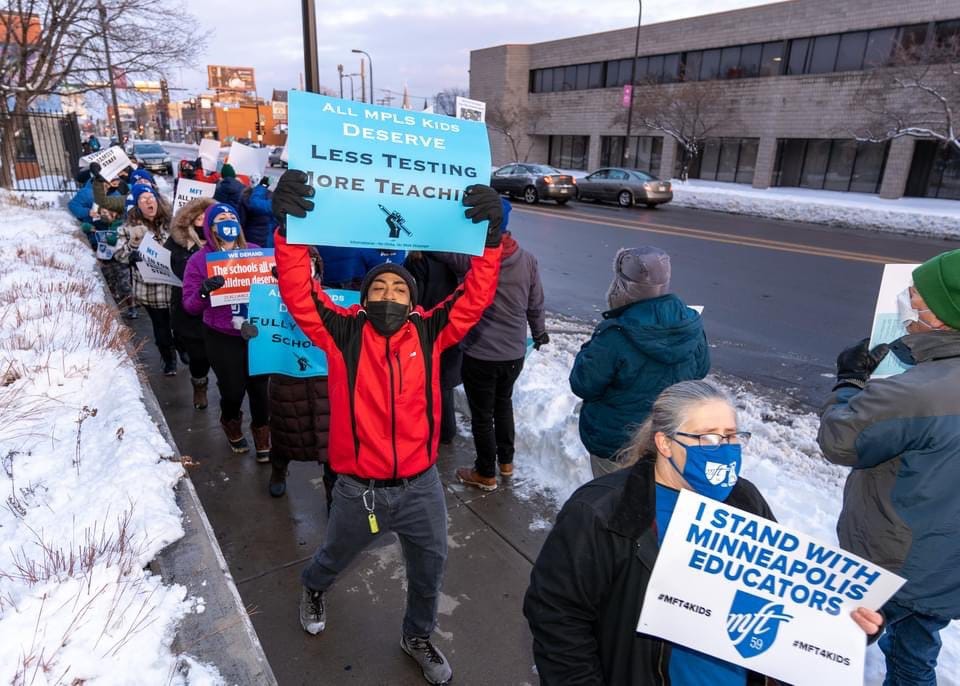Why the Minneapolis Strike Matters
With public schools in limbo nationwide, the stakes of the strike couldn't be higher
Minneapolis educators are on strike as of 7:30 this morning — and, with the fate of public schools in limbo nationwide, the stakes of their struggle are high. You’ll find below links to my fresh-off-the-presses article in the The Nation on the national stakes of the strike, followed by a moving new interview in Jacobin with union presidents Greta Callahan and Shaun Laden on on why teachers and support staff walked out. (Please share these pieces on social media, it’ll generate national support for their strike.) Also, I’m on the ground in Minneapolis reporting this week, you can follow me here for live updates and videos from the strike. If you’re in the area, see you on the picket line!
Minneapolis Educators Strike for the Common Good
Eric Blanc
Thousands of educators are on strike in Minneapolis, two years into a pandemic that has pushed public education to a breaking point across the country. With the future of education in unprecedented limbo, the stakes are high — and not just in the Twin Cities.
Public schools have been in crisis well before Covid-19. Especially in predominantly non-white, working-class school districts like Minneapolis, decades of underfunding, privatization, high-stakes testing, and low educator pay made it increasingly difficult for teachers and support staff to provide the education their students deserve.
To overcome such conditions, an unprecedented upsurge in strikes erupted from West Virginia to Los Angeles in 2018 and 2019. “Red for Ed” succeeded in energizing educators, capturing headlines, and challenging the bipartisan consensus in favor of privatizing education, but its progress was abruptly checked by the pandemic. Nowhere was this dynamic clearer than in St. Paul, where teachers and support staff were three days into a strike in March 2020 when Covid-19 forced an end to their action. While other sectors of organized labor have recently shown promising signs of militancy, school workers throughout the pandemic have just struggled to keep their heads above water.
In the Twin Cities and beyond, the past two years have reversed Red for Ed’s political momentum and exacerbated structural stressors and inequities, resulting in increased educator outflows from the profession and increased family outflows from public schools. By late 2021, a quarter of teachers, and almost half of Black teachers, indicated in national surveys that they were considering leaving their jobs. Over the past 18 months, Minneapolis Public Schools have lost over 640 teachers and support professionals.
Schools have lacked basic resources necessary to address students’ mental distress in the face of pandemic conditions, the police murder of George Floyd, and subsequent social unrest. In line with a growing trend of progressive unions to “bargain for the common good,” one of the Minneapolis strike’s major demands is for every school to be provided with a social worker and counselor every day, as well increased hiring of school psychologists. “As educators, we have been saying ‘What about the kids?’ for decades,” explains Greta Callahan, president of the teachers’ chapter of the Minneapolis Federation of Teachers. “And right now we’re at a place where we can no longer allow students to pay for the mistakes made by those at the top.”
Read full article here in The Nation
Why Minneapolis Educators Are on Strike
AN INTERVIEW WITH GRETA CALLAHAN AND SHAUN LADEN
Teachers and support staff in Minneapolis and Saint Paul say they’re no longer willing to let their students pay for the mistakes made by officials who’ve neglected and mismanaged the public education system. Now they’re on strike.
INTERVIEW BY Eric Blanc
Minneapolis educators are on strike. Union demands include living wages for support staff, funding for essential mental health resources, competitive pay for teachers, lower class sizes, and effective policies to recruit and retain educators of color.
After two pandemic years that have exhausted educators, accelerated the deterioration of public schooling, and put the national Red for Ed movement on the defensive, the Minneapolis strike has stakes that extend well beyond Minnesota. Jacobin’s Eric Blanc spoke with Greta Callahan and Shaun Laden, the presidents, respectively, of the teacher and educational support professionals (ESPs) chapters of Minneapolis Federation of Teachers (MFT), Local 59.
EB
What is your reply to critics who say that a strike in the Twin Cities will hurt students?
GC
As educators, we have been saying “What about the kids?” for decades. And we’ve done everything we could possibly do to win the schools that they deserve without striking: we have petitioned, we have rallied, we have marched on the governor’s mansion, we have shown up to school board meetings, we have written more letters than anyone can count, we have organized informational pickets, we’ve been on every single news source.
We have done everything in our power to fight for our kids. And right now, we are at a place where we can no longer allow students to pay for the mistakes made by those at the top, who have mismanaged our schools. After trying literally everything else, we’re prepared to strike if we have to.
EB
Ever since the police murder of George Floyd and the mass protests that followed, Minneapolis has been at the center of debates over racism in the United States. How do you see your struggle as related to the fight for racial justice?
SL
One thing that we’ve really tried to raise up in this campaign is that our hourly school workers — from food service workers to education support professionals — who are majority folks of color, are also the lowest paid and have the least amount of say in our work and our district.
If we’re going to talk about equity, if we’re going to talk about racial justice, we have to talk about how we treat everybody in our system. And the district doesn’t treat our members of color and our hourly workers with the dignity and respect that they deserve. We’re saying that something can be done to materially improve the lives of people, particularly groups of workers who are majority folks of color.
GC
This is the same fight — the fights are not separate. The majority of our students are students of color; everything we have put on the table is a fight for black lives, including all the things Shaun mentioned. Those at the top, those running our schools according to the corporate model, are really picking and choosing when they want to say they’re supporting our students or educators of color.
We’re trying to create some systemic change right now. Our public schools have to be strong if we want to build the world that we need to see. We’re all in, and we’re going to do whatever it‘s going to take to make this change.
EB
District leaders in both Minneapolis and St. Paul are pleading poverty — they say that they support you, but there’s just not enough money to meet your demands. What’s your response?
GC
We’ve crunched the numbers: the district has doubled its general fund balance over the last three years, and they now have $250 million of additional federal dollars [from the Joe Biden administration’s American Rescue Plan].
Their “plan” is to maintain the status quo — which means preserving a situation that is pushing families to flee this district and pushing educators to do the same. With these people in charge, nothing is going to change without a movement. So we are reclaiming our schools, for our students to receive the high-quality education that they deserve.
SL
We’ve got to push back on this idea that there’s not enough. The state of Minnesota is currently a state of abundance — we have a $9 billion surplus right now. So when any elected official says there’s just not enough or that we can’t afford it, it’s just not true.
There’s a mind shift that has to happen. Politicians have been pushing for fifty years this idea that we need to have more of the marketplace and fewer public goods. As educators, we need people to insist with us that we need more for the public good. We need to invest in our kids, we need to invest in each other — whether that’s education, housing, childcare, or eldercare. We need a society that truly cares about one another, which is why we’re coming together to win that through collective action.
EB
Shaun, could you speak more about the role that educational support professionals play in schools and why they are such an important part of your struggle? When it comes to education or the Red for Ed movement, support staff often get overlooked, with the public seeing only teachers.
SL
We like to say that “we make school happen.” Whether it’s a question of improving literacy, whether it’s social and emotional learning, whether it’s implementing restorative practices, whether it’s minimizing students’ time outside of class — all those things are done by ESPs.
And so, when we talk about improving outcomes for students and improving climates in our schools, our folks are at the center. And what we have is a system that doesn’t recognize that. Instead, it attempts to just burn through us with high turnover, by paying folks as little as possible.
One thing we really have tried to do is get our members to have conversations with their licensed colleagues about their material conditions. Part of the corporate, top-down model is about keeping people in isolation — so when you break that isolation by communicating and talking about how much we get paid or how little we get paid, I think that’s been really powerful to motivate people.
Read full interview here in Jacobin



